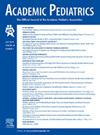A Pilot Randomized Controlled Trial of Text Messages to Improve Well-Child Visit Attendance After No-Show
IF 3
3区 医学
Q1 PEDIATRICS
引用次数: 0
Abstract
Objective
Evaluate the effectiveness of text messages to systematically engage parents/guardians (“caregivers”) to reschedule a well-child visit (WCV) that was missed (“no-show”) and attend that rescheduled WCV visits.
Methods
Patients <18 years in one of five pediatrics or family medicine clinics, in one health system in the Southeast US, were eligible. Patients without a rescheduled WCV after a no-show were randomized into intervention (text messages) or care-as-usual comparison, stratified by language (English/Spanish). Enrollment occurred May–July 2022. Up to three text messages were sent to caregivers one week apart via REDCap and Twilio, advising how to reschedule the missed appointment by phone or health portal. Primary outcomes were 1) rescheduling a WCV within 6 weeks of no-show and 2) completing a rescheduled WCV within 6 weeks. Risk differences (RD) and odds ratios (OR) were used to evaluate the effect of text messages.
Results
Seven hundred and twenty patients were randomized and analyzed (texts: 361, comparison: 359). The proportion rescheduling WCV after text versus usual care was English: 18.85% versus 15.02%, respectively, and Spanish: 5.94% versus 8.14%, with overall RD + 1.98% (95% CI: −1.85, 5.81) and OR 1.21 (95% CI: 0.79, 1.84; P-value .38). Completed WCV rates in text or usual care were English: 13.08% versus 6.59%, and Spanish: 5.81% versus 5.94% with texts associated with RD + 2.83% (95% CI: 1.66, 4.00) and OR 1.86 (95% CI: 1.09, 3.19).
Conclusion
Text message follow-up after a no-show WCV may positively impact attendance at WCVs rescheduled in the subsequent 6 weeks.
Trial registration
ClinicalTrials.gov NCT05086237.
一项试点随机对照试验,通过短信提高未就诊儿童的就诊率。
目标:评估短信在系统性地吸引父母/监护人("照顾者")重新安排已错过("未到场")的儿童健康检查(WCV)和参加重新安排的儿童健康检查的有效性:患者 结果:随机对 720 名患者进行了分析(文本:361 人,对比:359 人)。文本与常规护理相比,重新安排 WCV 的比例为:英语:18.85% 对 15.15%:总体 RD +1.98% (95% CI: -1.85, 5.81),OR 1.21 (95% CI: 0.79, 1.84; p 值 0.38)。在文本或常规护理中,完成 WCV 的比例为英语:13.08%对6.59%,西班牙语:5.81%对5.94%,短信相关的RD +2.83% (95% CI: 1.66, 4.00)和OR 1.86 (95% CI: 1.09, 3.19):结论:WCV缺席后的短信跟踪可能会对随后6周内重新安排的WCV出席率产生积极影响:试验注册:ClinicalTrials.gov NCT05086237。
本文章由计算机程序翻译,如有差异,请以英文原文为准。
求助全文
约1分钟内获得全文
求助全文
来源期刊

Academic Pediatrics
PEDIATRICS-
CiteScore
4.60
自引率
12.90%
发文量
300
审稿时长
60 days
期刊介绍:
Academic Pediatrics, the official journal of the Academic Pediatric Association, is a peer-reviewed publication whose purpose is to strengthen the research and educational base of academic general pediatrics. The journal provides leadership in pediatric education, research, patient care and advocacy. Content areas include pediatric education, emergency medicine, injury, abuse, behavioral pediatrics, holistic medicine, child health services and health policy,and the environment. The journal provides an active forum for the presentation of pediatric educational research in diverse settings, involving medical students, residents, fellows, and practicing professionals. The journal also emphasizes important research relating to the quality of child health care, health care policy, and the organization of child health services. It also includes systematic reviews of primary care interventions and important methodologic papers to aid research in child health and education.
 求助内容:
求助内容: 应助结果提醒方式:
应助结果提醒方式:


